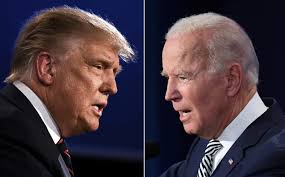First in a series.
During the upcoming presidential election, many Americans will once again be voting against someone, rather than voting for someone — if they vote at all.
Both candidates, but especially President Trump, have their share of detractors.
President Trump has been called a bully, a liar, a philanderer and a narcissist. He is attacked daily in the media, including social media, more frequently than any president in history. The attacks aren’t always warranted, but sometimes they are.
Democratic challenger Joe Biden is gaffe-prone and many have questioned his mental acuity. He’s been accused of sexual assault and of using his influence to enrich family members.
But one of them will be president.
You may have decided which candidate you’d prefer to be president based on his character. You’ve also had nearly four years during which to judge President Trump and 47 years during which to judge Joe Biden, who served as a U.S. Senator and vice president in addition to running for president three times.
Many voters will vote based on who the candidate is, but it’s also important to consider what the candidate stands for. Voters know enough about both candidates to vote based on who they are, but let’s consider the “what.”
More Government vs. Less Government
The president shapes a party’s policies and priorities, but generally follows the policies his party represents. What the president and his party stand for is especially important this year, as both candidates are septuagenarians and could conceivably be replaced by their vice presidents before their term ends. Biden is 77 and Trump is 74.
In general, challenger Biden sees a greater role for government in protecting the environment, creating greater equality and achieving other social goals. President Trump’s policies are meant to help the private sector create more jobs and increase wealth across the board.
President Trump’s tax reform and deregulation spurred faster economic growth than his predecessor, but those who support free markets dislike his trade policy, which has resulted in numerous tariffs on imports, but also retaliatory tariffs on American goods.
He’s also significantly limited immigration and is building a wall between the United States and Mexico. The wall fulfills a campaign pledge, but U.S. taxpayers are paying for it, not Mexico, as he had promised.
Candidate Biden, meanwhile, is often referred to as a moderate, but he served eight years as President Obama’s vice president, which is moderate only when compared with today’s Democratic Party.
And while socialist Bernie Sanders might have been the Democratic candidate if he were electable, he and other progressives are having a heavy influence on the party. Biden and Sanders jointly led a policy task force that included progressives such as Congressional social warrior Alexandria Ocasio-Cortez — aka AOC.
So where do the candidates stand on issues that may be important to you? We’ll explore some of those issues in the posts that follow.

